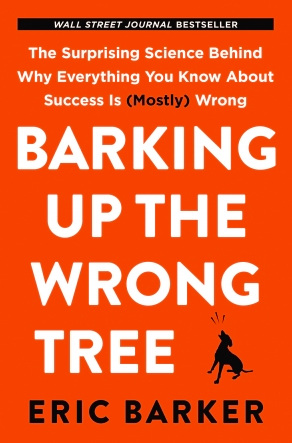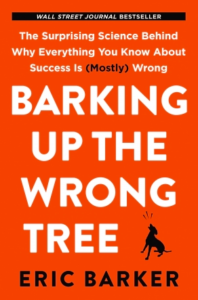Did your high school valedictorian go on to achieve greatness?
High schools select their valedictorians because they show promise and exemplify the best the school has to offer. So it’s not unreasonable for us to expect them to achieve great things.
Many achieve success in their future careers. But greatness tends to be rare. And that’s why screenwriter and blogger Eric Barker features them in his quirky, eclectic, science-based book on achievement, Barking up the Wrong Tree.
Boston College’s Karen Arnold followed 87 high school valedictorians, finding their future marks at university were high, many went on to graduate degrees and nearly 90 per cent ended up in professional careers. Impressive, but not impressive enough, she concluded: “Valedictorians aren’t likely to be the future’s visionaries … they typically settle into the system rather than shake it up.” That’s likely because they were too conformist and were generalists, more inclined to shore up weak parts in their academic studies than spectacularly excel at anything.
Barking up the Wrong Tree
By Eric Barker
HarperCollins, 307 pages, $33.50
Compare that, Barker says, to Winston Churchill, a maverick with many flaws but who proved the right man for the Hitler era, or Abraham Lincoln, whose strengths overwhelmed his glaring weaknesses and allowed him to win the Civil War and keep the United States one nation. Barker believes the research of Harvard Business School Professor Gautam Mukunda helps to explain their success. Mukunda differentiates between “filtered” leaders, who rise up through the ranks, and “unfiltered,” who barge in from left field, unexpectedly. Filtered leaders are like those valedictorians: Solid and traditional in their approach, effective but indistinguishable from each other. The unfiltered folks can’t be relied on to make the standard decisions and are often unpredictable.
“Yet they bring change and make a difference,” Barker observes. “Often that difference is negative. Since they don’t play by the rules, they often break the institutions they are guiding. A minority of unfiltered leaders are transformative, though, shedding organizations of their misguided beliefs and foolish consistencies, and running them toward better horizons. These are the leaders that the research said have enormous impact.”
He tested this notion on U.S. presidents, albeit before the current unfiltered one took office. He evaluated which were filtered and unfiltered, and whether or not they were great leaders. His theory predicted presidential impact with a statistical confidence of 99 per cent, Barker notes, adding, “The filtered leaders didn’t rock the boat. The unfiltered leaders couldn’t help but rock it. Often they broke things, but sometimes they broke things like slavery, as Abraham Lincoln did.”
Often we have attributes associated with leadership success, and we figure the more of those a person has, the greater the chance of success. But Mukunda says the difference between good and great leaders is not an issue of “more.” Great leaders are fundamentally different people. A better Neville Chamberlain would not have saved the day for Britain. “They didn’t need a more filtered leader; they needed someone the system would have never let in the door. The old ways didn’t work, and doubling down on them would have been disastrous. To fight a menace like Hitler, they needed a maverick like Churchill,” he says.
Mukunda focuses on “intensifiers,” attributes that are considered negative but in the context become positives, like Churchill’s defence of the British state, which at one time seemed paranoid but became powerful. Mr. Barker points to Glenn Gould, who went beyond eccentric but was a magnificent pianist. “That nut is a genius,” the Cleveland Orchestra’s George Szell said.
Steve Jobs understood this. When he took over Pixar, he wanted to overcome a creativity crisis and declared: “Give us the black sheep. I want artists who are frustrated. I want the ones who have another way of doing things that nobody’s listening to. Give us all the guys who are probably headed out the door.”
What does this mean if you’re not Glenn Gould or a high school valedictorian? Mr. Barker says we spend too much time trying to be “good” when that only makes us average. “To be great we must be different. And that doesn’t come from trying to follow society’s vision of what is best, because society doesn’t always know what it needs. More often being the best means just being the best version of you…. In the right environment, bad can be good and odd can be beautiful,” he writes.
This applies to colleagues as well. “The same traits that make people a nightmare to work with can also make them people who change the world. Research shows that very creative people are more arrogant, dishonest, and disorganized. They also get lower grades in school,” he says, noting they are disliked because they don’t do what teachers or bosses expect. “So it’s no surprise that creativity is inversely correlated with employee performance reviews.”
How do you become successful? Mukunda says first you need to know and accept yourself. If you’re a filtered leader, double down on that, finding a good path. If you have significant intensifiers, don’t dampen them as you’ll only be at odds with who you are and close off your key advantages.
Find out your signature strengths, and accept them. Then Mukunda advises you to pick the right pond: Which institutions and situations value what you do?
“You’ve got to pick the environment that works for you…. Context is so important. The unfiltered leader who is an amazing success in one situation will be a catastrophic failure in the other, in almost all cases,” Mukunda says. You have been successful because you have been in environments suitable for your success, not because of your unique brilliance.
That’s the story of the valedictorians. They had no problem getting A’s in school. That was a context they excelled in. But they weren’t as successful when they moved to a different career environment.
Picking the right pond also applies when Barker tackles the question of whether nice guys finish first. They do and they don’t. Sometimes jerks thrive. Sometimes nice guys excel, as Adam Grant showed in his book Give and Take. If that isn’t confusing enough, Barker notes that pirates often treated each other well – they were democratic and trusted one another. Blackbeard didn’t kill anyone, and there is no record of anyone walking the plank on a pirate ship. But their bloodthirsty image helped convince targets to give in quickly.
Barker offers this advice:
- Pick the right pond: A pirate’s den may be fine, a snake pit is not. Take a long look at the people you will be working with, as over the long term you will become like them.
- Co-operate first: Offer favours to others, and over time they will reciprocate, research suggest. In negotiations, Harvard Business Professor Deepak Malhotra stresses the other side needs to like you. That’s more critical than being tough or showing the other side you mean business.
- Being selfless isn’t saintly, it’s silly: Trusting others works best in general, but for a specific interaction you can’t predict how successful co-operating will be. A study on the power of trust found that most successful people ranked themselves an eight – not a 10 – on a 10-point scale in terms of how much they trusted others. If others seem to always take from you, don’t retaliate. Instead, gossip – tell others about them. You will feel better and it helps to police their bad behaviour.
- Work hard but make sure it gets noticed: Jerks self-promote. You need to as well. Be visible. Your boss needs to like you. Every Friday, he suggests sending your boss a quick email on what has been accomplished this week.
- Think long-term: Bad behaviour can win in the short term but over the long term good behaviour wins out.
- Forgive: Writing people off can result in this complicated world from lack of clarity. So ease up. “You’re not perfect, others aren’t perfect, and sometimes people get confused,” he says.
The book lacks simple answers, as Barker takes us through the twists and turns on the issues he decided to investigate. But he’s a smooth, clear writer, gliding you through the contradictory ideas, and as the end of each chapter has a handy, practical summary, as with the example above about whether nice guys finish first.


